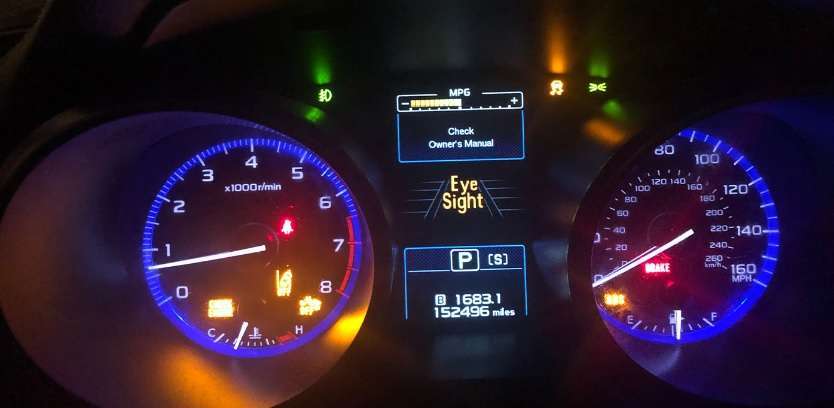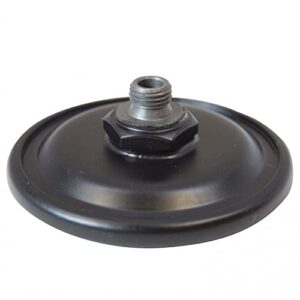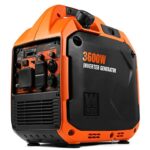Subaru outback eyesight turns off by itself due to possible system malfunctions or errors. This can happen if there is a problem with the sensors, cameras, or software.
In some cases, environmental factors such as glare or extreme weather conditions can also impact the system’s performance.
Regular maintenance and software updates can help prevent or resolve these issues. It is important to consult with a subaru dealership or authorized service center to diagnose and fix any problems.
Additionally, it is essential to follow the manufacturer’s guidelines for the safe use and maintenance of the eyesight system to ensure optimum performance and safety on the road.
Understanding The Subaru Outback Eyesight System
The Subaru outback eyesight system is a cutting-edge technology that enhances safety and provides an extra layer of protection for both the driver and passengers.
This advanced feature utilizes innovative cameras and sensors to detect potential dangers on the road and assist the driver in avoiding accidents.

In this section, we’ll delve into the details of the eyesight system and its key functionalities.
Overview Of The Subaru Outback Eyesight System
- The eyesight system is a comprehensive suite of safety features designed to prevent collisions and mitigate the severity of impact.
- It employs two stereo cameras strategically placed near the rearview mirror, providing a wide-angle view of the road ahead.
- By processing visual information, the system effectively monitors traffic conditions, detects potential hazards, and alerts the driver to take appropriate actions.
How The Eyesight System Works
- There are four primary components that enable the eyesight system to function seamlessly: Pre-collision braking, adaptive cruise control, lane keep assist, and lane departure warning.
- Pre-collision braking utilizes the stereo cameras to assess the proximity of vehicles and objects ahead. In the event of an imminent collision, it automatically applies the brakes to minimize the impact and potentially avoid the accident altogether.
- Adaptive cruise control allows the driver to set a desired speed and following distance, while the system continuously adjusts the vehicle’s speed to maintain a safe distance from the vehicle ahead.
- Lane keep assist, on the other hand, actively monitors the position of the outback within its lane. If the system detects unintended drifting, it gently corrects the steering to keep the vehicle centered.
- Lane departure warning acts as an additional safety net, alerting the driver with visual and audible signals if the vehicle begins to veer out of its lane.
Key Features And Benefits Of The Eyesight System
- Improved safety: The eyesight system significantly reduces the risk of accidents by providing constant monitoring and proactively intervening when necessary.
- Mitigated collisions: With its pre-collision braking feature, the system can help lessen the severity of collisions or even prevent them entirely.
- Increased comfort: Adaptive cruise control takes the stress out of long drives by maintaining a safe distance from the vehicle in front, while allowing the driver to relax.
- Enhanced stability: Lane keep assist enhances vehicle stability by ensuring it remains in the intended lane, reducing the likelihood of unintended lane drift.
- Peace of mind: The lane departure warning system acts as a safety net, alerting the driver of any potential lane departures, promoting safer driving habits and preventing potentially dangerous situations.
The subaru outback eyesight system is a game-changer when it comes to automotive safety technology. With its advanced capabilities and seamless integration into the vehicle, this system offers drivers unparalleled peace of mind on the road.
So the next time you hop behind the wheel of an outback equipped with eyesight, rest assured that you have an extra set of virtual eyes looking out for you.
Common Reasons For Eyesight System Turning Off Automatically
The eyesight system in subaru outback is designed to provide advanced driver assistance features, enhancing safety on the road.
However, there are instances when the system may turn off automatically, leaving drivers puzzled. Let’s explore some common reasons for the eyesight system turning off unexpectedly.
Sensor Or Camera Blockage
- Sensors or cameras could be blocked by debris, such as dirt, snow, or ice, obstructing their view and preventing the system from functioning properly.
- Insect residue or bird droppings on the sensors or cameras may interfere with their effectiveness.
- Objects placed on the dashboard or windshield could obstruct the view of the sensors or cameras and cause the system to turn off.
- Tinted windows or window stickers in the driver’s line of sight can interfere with the functioning of the eyesight system.
Environmental Factors That Affect System Performance
- Low lighting conditions, such as dusk or dawn, may affect the system’s ability to detect objects accurately, leading to automatic shutdown.
- Adverse weather conditions such as heavy rain, fog, or mist can impact the performance of the eyesight system, causing it to temporarily turn off.
- Bright sunlight or glare, particularly when traveling towards the sun, can affect the system’s sensors, resulting in automatic shutdown.
- Extreme temperatures, either too hot or too cold, can influence the functioning of the system and lead to it turning off.
Software Glitches Or Issues
- Outdated software or firmware could cause the system to malfunction and turn off unexpectedly. Updating the system to the latest version may resolve this issue.
- Software conflicts or bugs could interfere with the proper functioning of the eyesight system, leading to automatic shutdowns.
- Incompatibility with other vehicle systems or devices may cause the system to have conflicts and turn off.
Electrical Problems
- Faulty wiring, loose connections, or other electrical issues can cause the eyesight system to shut down temporarily or permanently.
- A weak or failing battery can affect the system’s power supply, resulting in it turning off automatically.
- Fuse-related problems or issues with other electrical components in the vehicle can impact the functionality of the system.
Remember, if your subaru outback’s eyesight system turns off unexpectedly, it’s essential to check for sensor or camera blockage, consider environmental factors, monitor for software glitches or issues, and examine any potential electrical problems.
Regular maintenance, cleaning, and addressing any issues promptly will ensure the proper functioning of the eyesight system, providing you with the advanced driver assistance features you rely on for a safer driving experience.
Troubleshooting Steps For Eyesight System Turning Off By Itself
Does your subaru outback’s eyesight system keep turning off by itself? This can be frustrating and concerning, but fear not! There are a few troubleshooting steps you can take to address this issue before resorting to contacting a subaru dealership for assistance.
Let’s dive into the possible solutions:
Checking For Sensor Or Camera Blockage
If the eyesight system is turning off, it could be due to blockage in the sensors or cameras. Here’s what you can do:
- Visually inspect the sensors and cameras to ensure they are not obstructed by dirt, debris, or other objects.
- Remove any dirt or debris from the sensors and cameras by gently wiping them with a clean, soft cloth.
- Make sure nothing is blocking the field of view of the sensors and cameras, such as stickers or accessories on the windshield.
Cleaning The Sensors And Cameras
Dirty sensors and cameras can also cause the eyesight system to turn off unexpectedly. Follow these steps to clean them:
- Use a microfiber cloth or lens cleaning wipes to gently wipe the sensors and cameras.
- Avoid using harsh chemicals or abrasives, as they can damage the surfaces.
- Be thorough in cleaning all the sensors and cameras to ensure optimal performance.
Resetting The Eyesight System
Sometimes, a simple reset can solve the issue. Here’s how you can do it:
- Park your Subaru outback in a safe location and turn off the engine.
- Open the driver’s side door and leave it open for about 30 seconds.
- Close the door and start the engine.
- On the display screen, go to the settings menu and locate the eyesight section.
- Look for an option to reset the system and follow the on-screen instructions to complete the process.
Contacting A Subaru Dealership For Assistance
If none of the above steps resolve the issue and your eyesight system still turns off on its own, it’s time to seek professional help.
Reach out to your nearest subaru dealership and explain the problem you are facing. They will have experienced technicians who can diagnose and fix the issue for you.
Remember, troubleshooting steps may vary depending on the specific model and year of your subaru outback. It’s always a good idea to consult your vehicle’s owner’s manual for detailed instructions and guidelines.
By following these troubleshooting steps, you can potentially resolve the issue of your subaru outback’s eyesight system turning off by itself.
Keep your subaru safe and enjoy the peace of mind that comes with a functioning eyesight system.
Additional Tips To Ensure The Consistent Functioning Of Eyesight System
Regular maintenance and software updates:
- Schedule regular maintenance visits with an authorized Subaru service center to ensure your eyesight system is functioning optimally.
- Keep your vehicle’s software up to date by installing any available software updates provided by Subaru. This will ensure that your eyesight system has the latest features and enhancements for a more reliable and consistent performance.
Proper care and cleaning of the system components:
- Clean the sensors of your eyesight system regularly to remove any dirt or debris that may obstruct their view. Use a soft, non-abrasive cloth and a mild detergent to gently wipe the sensors clean.
- Ensure that the windshield in front of the eyesight cameras is free from any obstructions, such as stickers or tinting films. These can interfere with the system’s functionality.
Awareness of environmental factors that can affect the system:
- Be aware of any conditions that may affect the performance of your eyesight system. Heavy rain, fog, snow, or bright sunlight can potentially impact the system’s ability to detect obstacles accurately. Adjust your driving accordingly and be prepared to rely on your own judgment when necessary.
Following the manufacturer’s guidelines for system usage:
- Read the vehicle’s owner’s manual thoroughly to understand the recommended usage guidelines for the eyesight system. This includes information on its limitations, when it should be turned off, and any specific driving conditions to avoid.
- Avoid covering or placing objects near the eyesight cameras. Obstructing their view can compromise the system’s ability to detect potential hazards and may lead to a malfunction.
Remember, the eyesight system is designed to assist drivers and provide an additional layer of safety on the road. While it is a sophisticated system, it is not infallible and should not replace vigilant driving practices.
By following these additional tips and maintaining the system properly, you can ensure the consistent functioning of your Subaru Outback’s eyesight system.
Drive safely and enjoy the added peace of mind that your eyesight system provides.
Frequently Asked Questions About Eyesight System Turning Off Automatically
If you own a Subaru outback with the eyesight system, you may have encountered instances where the system turns off by itself. This can be frustrating, especially if you rely on the system for added safety and convenience.
In this section, we will address some frequently asked questions regarding the automatic turning off of the eyesight system.
Let’s dive in and find out more.
Why Does My Eyesight System Turn Off Randomly?
- Power-saving feature: The eyesight system is designed to automatically turn off after an extended period of inactivity to conserve battery power. This is a normal behavior and helps to optimize the performance of your vehicle’s electrical system.
- Sensor obstruction: If the eyesight cameras and sensors are obstructed by dirt, snow, or ice, the system may temporarily turn off to ensure accurate and reliable operation. Regularly clean the sensors to prevent any hindrance.
- Faulty connection: A loose or faulty connection between the eyesight system components and the vehicle’s electrical system can cause the system to turn off randomly. It is recommended to have the connections checked by a qualified technician to resolve any underlying issues.
Can I Turn Off The Eyesight System Manually?
Yes, you have the option to manually turn off the eyesight system if needed. Here’s how:
- Locate the “eyesight disable” button usually found on the lower portion of your dashboard.
- Press and hold the button until you see a notification on the vehicle’s display confirming the eyesight system has been disabled.
How Can I Identify If There Is An Issue With My Eyesight System?
If you suspect there might be an issue with your eyesight system, here are a few signs to look out for:
- Error messages: Pay attention to any error messages or notifications that appear on your vehicle’s screen related to the eyesight system. These messages can provide valuable information about any potential problems.
- Warning lights: If you notice any warning lights on your dashboard, specifically related to the eyesight system, it could indicate an issue that needs attention. Consult your vehicle’s manual to understand the specific meaning of the warning light.
What Should I Do If My Eyesight System Keeps Turning Off?
If your eyesight system continues to turn off unexpectedly, here are some steps you can take:
- Check for obstructions: Ensure that the eyesight cameras and sensors are free from any dirt, snow, or ice. Clean them as necessary to ensure proper functionality.
- Verify power connections: Confirm that all connections between the eyesight system components and the vehicle’s electrical system are secure and functioning correctly.
- Schedule a service appointment: If the issue persists, it is advisable to schedule a service appointment with an authorized Subaru dealership or qualified technician. They will be able to diagnose and address any underlying issues causing the frequent turning off of your eyesight system.
Remember, preventing obstructions and keeping the eyesight components clean is crucial for optimal performance.
Regular maintenance and timely service can help ensure that your eyesight system functions reliably and provides you with enhanced safety features while driving your Subaru outback.
Frequently Asked Questions Of Why Is Subaru Outback Eyesight Turned Off By Itself
Why Does Subaru Outback Eyesight Turn Off By Itself?
The Subaru outback eyesight may turn off by itself due to various reasons, such as system malfunctions or driver actions.
How Do I Fix Subaru Outback Eyesight Turning Off?
To fix Subaru Outback eyesight turning off, try restarting the vehicle, checking for any error messages, and contacting a certified subaru technician for assistance.
Is It Normal For Subaru Outback Eyesight To Turn Off?
While occasional shutdowns may occur due to system updates or other factors, frequent or unexpected turning off of Subaru Outback eyesight requires professional examination.
Can Extreme Weather Affect Subaru Outback Eyesight?
Extreme weather conditions like heavy rain, snow, or fog can impact Subaru Outback eyesight’s functionality, potentially causing it to turn off for safety purposes.
What Should I Do If Eyesight Turns Off While Driving?
If subaru outback eyesight turns off while driving, safely pull over, restart the vehicle, and if the problem persists, contact a subaru service center for further diagnostics.
How Can I Prevent Subaru Outback Eyesight From Turning Off?
Regularly maintaining your Subaru Outback, keeping the windshield clean, and promptly addressing any warning messages can help prevent eyesight from turning off unexpectedly.
Conclusion
To conclude, the issue of Subaru Outback’s eyesight turning off by itself can be a frustrating experience for owners. While the eyesight system is designed to enhance safety on the road, occasional malfunctions can occur due to various reasons.
One possible cause could be a sensor or camera malfunction, which may require professional inspection and repair.
Another factor may be a software glitch or a faulty connection, which can be resolved through a system reset or software update.
It is important for subaru outback owners to stay aware of any unusual behavior with the eyesight system and take appropriate actions promptly.
Regular maintenance and servicing can also help prevent such issues. By understanding the potential causes and seeking timely solutions, subaru outback owners can continue to enjoy the benefits of the eyesight system and ensure a safe driving experience.







